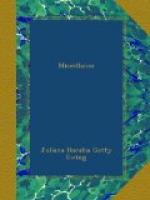“That is just what we feel,” said the Sweet-peas.
“I was very sad,” said the young girl softly, “very sad indeed; for, I thought you might be dead, or have married some one else, and that we might never meet again. But in spite of everything I couldn’t quite despair. It seemed impossible that those who really loved each other should be separated for ever.”
Meanwhile the Sweet-peas lay on the table. They were very happy, but just a little anxious, for the lovers had forgotten to put them in water, and they were fading fast.
“We are very happy,” they murmured, “very happy. This moment alone is worth all that we have endured. It is true we are fading before we have ever fully bloomed, and after this we do not know what will happen to us. But the young girl is right. One cannot quite despair. It seems impossible that those who really love each other should be separated for ever.”
COUSIN PEREGRINE’S WONDER STORIES.
THE CHINESE JUGGLERS, AND THE ENGLISHMAN’S HANDS.
(Founded on Fact.)
Cousin Peregrine had never been away quite so long before. He had been in the East, and the latter part of his absence from home had been spent not only in a foreign country, but in parts of it where Englishmen had seldom been before, and amid the miserable scenes of war.
However, he was at home at last, very much to the satisfaction of his young cousins, and also to his own. They had been assured by him, in a highly illustrated letter, that his arms were safe and sound in his coat-sleeves, that he had no wooden legs, and that they might feel him all over for wounds as hard as they liked. Only Maggie, the eldest, could even fancy she remembered Cousin Peregrine, but they all seemed to know him by his letters, even before he arrived. At last he came.
Cousin Peregrine was dressed like other people, much to the disappointment of his young relatives, who when they burst (with more or less attention to etiquette) into the dining-room with the dessert, were in full expectation of seeing him in his uniform, or at least with his latest medal pinned to his dress-coat.
Perhaps it was because Cousin Peregrine was so very seldom troubled by chubby English children with a claim on his good nature that he was particularly indulgent to his young cousins. However this may be, they soon stood in no awe of him, and a chorus cried around him—
“Where’s your new medal, Cousin? What’s it about? What’s on it?”
“Taku Forts,” said Cousin Peregrine, smiling grimly.
“What’s Tar—Koo?” inquired the young people.
“Taku is the name of a place in China, and you know I’ve just come from China,” said Cousin Peregrine.
On which six voices cried—
“Did you drink nothing but tea?”
“Did you buy lots of old China dragons?”




